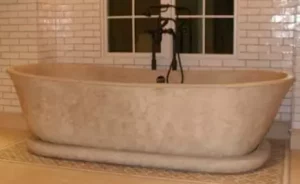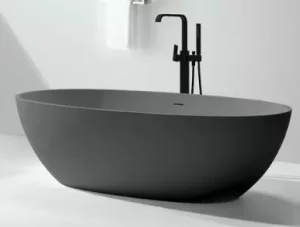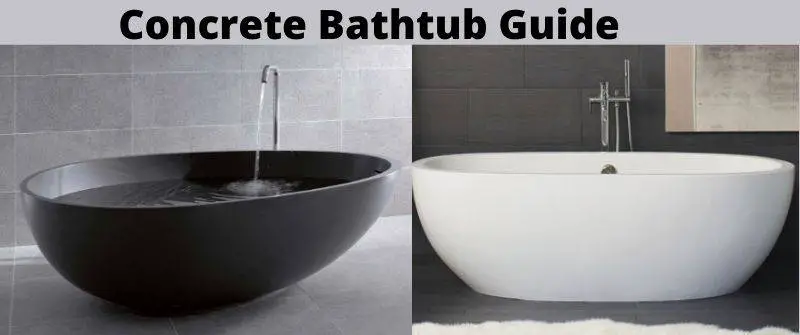Concrete bathtubs are becoming increasingly popular because of their unique design and durable qualities. Not everyone is aware that concrete is not just for the floors and walls of buildings, but also for structures like bathtubs and sinks.
Concrete Bathtub is an ideal material for manufacturing bathroom countertops or sinks. You can install concrete bathtubs in the bathrooms of your home or office to create an attractive environment at a considerable cost.
If a homeowner wants to add an artistic touch to the bathroom that can last long term, then the concrete tub is an excellent addition.
Concrete Bathtub Pros and Cons
Pros
1. Durable
Concrete is a strong material that is durable and long-lasting. The natural material is resistant to water damage and will not rot or warp over time.

Additionally, concrete can resist the growth of mold or mildew and has effective resistance against scratches and dents.
Concrete is great for its strength and resilience, so you can expect your tub to last you many years without needing any repairs or replacements.
Concrete is also resistant to chipping and cracking, which are common in other materials like ceramic or acrylic.
2. Customizable
Concrete bathtubs are also extremely customizable. You can choose the shape, size, style, color, and finish of your tub so that it perfectly complements your bathroom design. You can even choose the type of additives that go into the concrete to make it especially suited for use in bathrooms with high humidity or high traffic areas.
3. Value
Another benefit of a concrete bathtub is its value. While these tubs are by no means inexpensive, they do offer good value over time due to their long life span and high durability. This can be an attractive option for homeowners who are planning to remain in their homes for many years to come.
4. Exclusive Design
Concrete bathtubs are one of a kind. Handcrafted separately, so no two tubs will ever be exactly alike. You are guaranteed to have a unique bathroom that makes a statement when you go with concrete.
5. Easy Maintenance
Unlike traditional bathtubs made out of metal or fiberglass, concrete does not scratch or dent easily. It is also easy to clean because stains do not soak into the material and it is resistant to bacteria buildup. If you are looking for an investment that will last for decades without aging or wearing down.
Read on DIY concrete freestanding bathtubs.
Cons
1.Weight
Concrete is extremely heavy, making it difficult to move around once it has been cast. You will need a strong subfloor that can support the weight of the material.

Concrete is a heavy material and consequently, so are concrete bathtubs.
This can be problematic if you live in an older home or apartment that wasn’t built to withstand the weight of a concrete bathtub.
If you are considering having a concrete tub installed, make sure to speak with a contractor about reinforcing the space around it.
2. Hardness
Although concrete can produce a smooth surface, it is fairly hard. Which means that it isn’t as comfortable or warm against the skin as some other materials, such as acrylic or cast iron.
This hardness also makes concrete more susceptible to chips and cracks than other materials.
3. Cost
Concrete is an expensive material, which means that concrete bathtubs are often expensive as well. There is no way to get around this fact.
If you want a custom tub made of concrete, expect to pay top dollar for it. You will also have to pay more for shipping and installation because the tub will be heavy and difficult to maneuver.
4. Maintenance
Unlike many other materials, concrete needs special care when it comes to cleaning and sealing. This is especially true when it comes to the grout used between your tiles and the surface of your tub.
Consult a professional before attempting any maintenance on your concrete bathtub, even something as simple as washing it.
What is a Concrete Bathtub Mold?
A concrete bathtub mold is simply a mold made out of a strong, durable material that can withstand water and heat without deforming or warping.
There are various types of molds available for concrete casting: some made of plastic or metal; others made of rubber or silicone; even others made of wood or clay.
Cost of Construction vs. Concrete Bathtub for Sale -Which is Better?
The cost of construction can be high. Even though you may have the funds to cover it, the cost is still steep. In addition, there are other aspects such as the availability of materials and so on. A concrete tub can be a good option in this case.
The cost of these portable concrete tubs is much less than those that are cast at a factory because the material used in the manufacturing process is cheaper.
Another advantage of portable tubs is that they are portable. They also take up less space than those installed at a factory site. This makes them ideal for people who want to use their bathroom but do not want to spend too much money on it.
However, there are many portable concrete tubs on the market designed for building at home and transported to a site where they can be set up. These units come with pre-cast concrete panels or pre-cast steel frames.
The pre-cast panels come in different designs and sizes depending on the type of tub under use. The pre-cast steel frame is made from high-strength steel alloy and welded together into a frame.
Common Concrete Bathtub Ideas
Here are some common concrete bathtub ideas:
- Long and Narrow – For bathrooms with limited space, a long and narrow tub is a great option. Keep in mind that you should have about 2-3 feet of clearance on either side of the tub for ease of cleaning and access.
- Corner Tub – A corner tub will save space and make the bathroom feel more open at the same time. The shape itself adds an interesting design component to your bathroom as well. If you want to create this look yourself, use a jigsaw to cut out the ends of your mold where they will meet up with the wall to create a 90-degree angle.
- Bathtub/Shower Combo – You can make a tub that doubles as a shower if you want to save space or don’t have room for both. Use two drains, one on each end, so that you can use it as either a tub or shower.
Tips How to Maintain Concrete Bathtub
To extend the life of your concrete bathtub, you will want to take the time to clean and maintain it. Here are some tips on how to clean your concrete bathtub:

1. Cleaning Concrete Bathtub
The first thing that you will want to do is clean your bathtub.
It is important that you thoroughly clean your bathtub as often as possible.
If you wait too long, you could have stains that are extremely hard to get out.
It is best to wipe down the tub with a towel after each use.
2. Use Hot Water and Soap to Clean Bathtub
You should avoid using harsh chemicals when cleaning your bathtub, especially if it comes out of concrete. Using harsh chemicals can cause the surface of the tub to wear away over time and strip the paint off of it as well. Soap and hot water are enough to clean a concrete bathtub. You may also want to use a soft scrub brush sometimes too.
3. Get Rid Of Stains on Your Bathtub
If you have stains on your bathtub, be sure that you get rid of them right away so that they do not become permanent stains on your tub.
Frequently Asked Questions
Is a concrete bathtub good?
Yes. A concrete tub makes a bold statement in any bathroom and can suit your specific tastes. One can shape the material can into any form desired, including free-form designs and contemporary models with sharp angles or sleek lines.
Are concrete bathtubs cold?
Concrete bathtubs are not cold. They radiate heat very well. Their smooth, polished surface allows for a very high-quality finish that provides a warm and luxurious bathing experience.
How do you seal a concrete bathtub?
Seal the concrete bathtub using a grout sealer. A grout sealer is a liquid substance, applied to any porous surface, such as grout, concrete, or brick. The sealer penetrates the surface and creates a watertight barrier from moisture.
What's the most durable bathtub?
Cast iron bathtubs: Cast iron is a very durable material that will last for years if properly maintained. It can chip if hit by something hard, but overall these tubs should last 20-30 years without any major problems.
Can you use concrete for shower walls?
Concrete is a popular choice for shower walls. It works well for both tiled and non-tiled showers, but there are important differences between the two. It is also an excellent choice for floors or countertops, where it adds a modern look.
How long do concrete bathtubs last vs. others?
Concrete bathtubs can last upwards of 60 years. Fiberglass tubs and shower pans can last anywhere from 20-30 years if properly maintained. However, they do tend to become very brittle with age, which means they are more likely to crack or break.

As a homeowner, I am specifically keen on home improvement. I am passionate about homes, yards, and home improvement. I blog on home ideas and reviews on solutions that make homes better.

